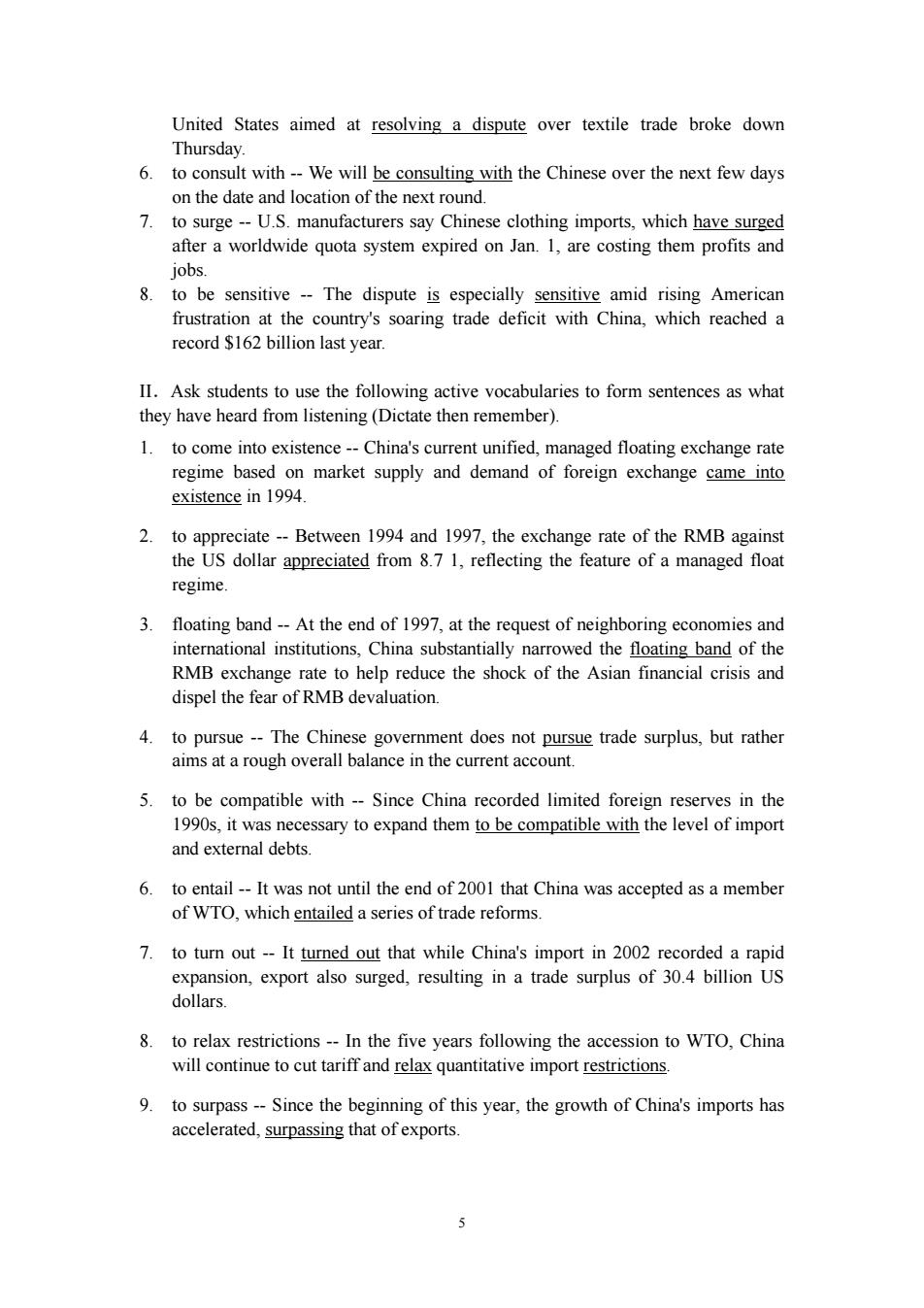正在加载图片...

United States aimed at resolving a dispute over textile trade broke down Thursday. 6.to consult with--We will be consulting with the Chinese over the next few days on the date and location of the next round. 7.to surge--U.S.manufacturers say Chinese clothing imports,which have surged after a worldwide quota system expired on Jan.1,are costing them profits and jobs. 8.to be sensitive --The dispute is especially sensitive amid rising American frustration at the country's soaring trade deficit with China,which reached a record $162 billion last year. II.Ask students to use the following active vocabularies to form sentences as what they have heard from listening(Dictate then remember). 1.to come into existence--China's current unified,managed floating exchange rate regime based on market supply and demand of foreign exchange came into existence in 1994. 2.to appreciate--Between 1994 and 1997,the exchange rate of the RMB against the US dollar appreciated from 8.7 1,reflecting the feature of a managed float regime 3.floating band--At the end of 1997,at the request of neighboring economies and international institutions,China substantially narrowed the floating band of the RMB exchange rate to help reduce the shock of the Asian financial crisis and dispel the fear of RMB devaluation. 4.to pursue--The Chinese government does not pursue trade surplus,but rather aims at a rough overall balance in the current account. 5.to be compatible with--Since China recorded limited foreign reserves in the 1990s,it was necessary to expand them to be compatible with the level of import and external debts. 6.to entail--It was not until the end of 2001 that China was accepted as a member of WTO,which entailed a series of trade reforms. 7.to turn out--It turned out that while China's import in 2002 recorded a rapid expansion,export also surged,resulting in a trade surplus of 30.4 billion US dollars. 8.to relax restrictions--In the five years following the accession to WTO,China will continue to cut tariff and relax quantitative import restrictions. 9.to surpass--Since the beginning of this year,the growth of China's imports has accelerated,surpassing that of exports.United States aimed at resolving a dispute over textile trade broke down Thursday. 6. to consult with -- We will be consulting with the Chinese over the next few days on the date and location of the next round. 7. to surge -- U.S. manufacturers say Chinese clothing imports, which have surged after a worldwide quota system expired on Jan. 1, are costing them profits and jobs. 8. to be sensitive -- The dispute is especially sensitive amid rising American frustration at the country's soaring trade deficit with China, which reached a record $162 billion last year. II.Ask students to use the following active vocabularies to form sentences as what they have heard from listening (Dictate then remember). 1. to come into existence -- China's current unified, managed floating exchange rate regime based on market supply and demand of foreign exchange came into existence in 1994. 2. to appreciate -- Between 1994 and 1997, the exchange rate of the RMB against the US dollar appreciated from 8.7 1, reflecting the feature of a managed float regime. 3. floating band -- At the end of 1997, at the request of neighboring economies and international institutions, China substantially narrowed the floating band of the RMB exchange rate to help reduce the shock of the Asian financial crisis and dispel the fear of RMB devaluation. 4. to pursue -- The Chinese government does not pursue trade surplus, but rather aims at a rough overall balance in the current account. 5. to be compatible with -- Since China recorded limited foreign reserves in the 1990s, it was necessary to expand them to be compatible with the level of import and external debts. 6. to entail -- It was not until the end of 2001 that China was accepted as a member of WTO, which entailed a series of trade reforms. 7. to turn out -- It turned out that while China's import in 2002 recorded a rapid expansion, export also surged, resulting in a trade surplus of 30.4 billion US dollars. 8. to relax restrictions -- In the five years following the accession to WTO, China will continue to cut tariff and relax quantitative import restrictions. 9. to surpass -- Since the beginning of this year, the growth of China's imports has accelerated, surpassing that of exports. 5